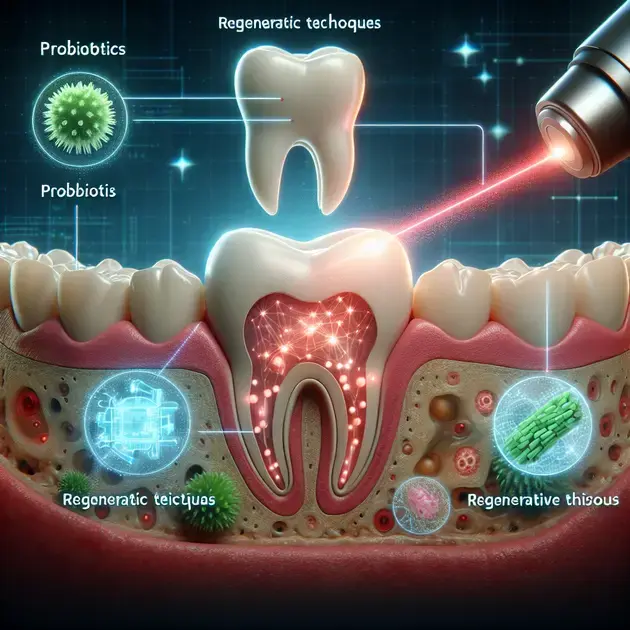Periodontitis is a common inflammatory disease that affects the gums and bone supporting the teeth. If left untreated, it can lead to tooth loss and other serious health complications. In this comprehensive guide, we will explore the most effective medication options available for treating periodontitis.
Recent advancements in periodontal research have led to the development of new medications that can effectively combat the progression of periodontitis. By following this guide, you will gain valuable insight into the most up-to-date treatment options to manage and improve the health of your gums.

The Importance of Effective Medication for Periodontitis
Periodontitis is a serious gum infection that damages the soft tissue and destroys the bone that supports your teeth. Without proper treatment, periodontitis can lead to tooth loss and other health problems. Effective medication plays a crucial role in managing and treating periodontitis.
One essential medication for periodontitis is antibiotic therapy. Antibiotics can help control the bacterial infection causing the gum disease. Prescription antibiotics like Amoxicillin or Doxycycline are commonly used to treat periodontitis. You can consult with your dentist or periodontist to determine the most suitable antibiotic for your condition.
Another important medication for periodontitis is antiseptic mouthwash. Antiseptic mouthwashes containing ingredients like chlorhexidine can help reduce the bacterial load in your mouth, improving the effectiveness of your oral hygiene routine. Brands like Listerine or Crest Pro-Health offer effective antiseptic mouthwashes that you can purchase at your local pharmacy or online.
To ensure the effectiveness of your medication for periodontitis, it’s crucial to follow your dentist or periodontist’s instructions carefully. Make sure to take your prescribed antibiotics as directed and use your antiseptic mouthwash regularly as part of your oral care routine. Consistent and proper use of medication is key to managing periodontitis effectively.
For additional support and information on medication for periodontitis, you can refer to reputable dental websites such as the American Academy of Periodontology (www.perio.org). These websites offer valuable resources on periodontal health, including medication options, dosage guidelines, and treatment recommendations.
Understanding the Medication Options Available
When it comes to medication for periodontitis, there are several options available to help manage the condition and promote gum health. Understanding these medication options can empower you to make informed decisions about your oral care.
One common medication option for periodontitis is subgingival antibiotics. These antibiotics are directly applied to the periodontal pockets where bacteria thrive. Brands like Arestin provide subgingival antibiotic treatments that can effectively target the infection and promote gum healing. Your dentist or periodontist can administer these antibiotics during your regular dental visits.
In addition to antibiotics, topical gels containing antimicrobial agents are another medication option for periodontitis. These gels are applied directly to the gums to reduce inflammation and combat bacteria. Products like PerioGard offer effective antimicrobial gel treatments that can be used in combination with other periodontal therapies for optimal results.
For individuals looking for natural medication options for periodontitis, herbal mouth rinses and supplements can be considered. Herbal products containing ingredients like tea tree oil or echinacea have antimicrobial properties that can help support gum health. Websites like www.herbalremedies.com provide a variety of herbal remedies for oral care that you can explore as complementary treatments for periodontitis.
Consulting with your dentist or periodontist is essential to understand the medication options available and determine the most suitable treatment plan for your specific needs. Your dental professional can evaluate your oral health condition, recommend appropriate medications, and monitor your progress to ensure optimal results.
Achieving Optimal Oral Health with the Right Medication
Optimal oral health is attainable with the right medication regimen tailored to your individual needs. By incorporating the right medication into your oral care routine, you can effectively manage periodontitis and promote overall gum health.
Start by scheduling a comprehensive dental evaluation with your dentist or periodontist to assess your oral health condition and discuss suitable medication options. Your dental professional can create a customized treatment plan that may include prescription antibiotics, antiseptic mouthwashes, or other specialized medications based on the severity of your periodontitis.
Follow the prescribed medication regimen diligently to ensure its effectiveness in combating the gum infection. Keep track of your medication schedule, follow proper dosage instructions, and maintain good oral hygiene practices to support the healing process. Consistent adherence to your medication plan is essential for achieving optimal oral health outcomes.
In addition to medication, adopting a healthy lifestyle and dietary habits can complement your oral care routine. Consuming a balanced diet rich in vitamins and minerals can support gum health and overall immune function. Avoiding tobacco products and limiting sugary foods can also contribute to better oral health and enhance the effects of your medication for periodontitis.
Regular dental visits for professional cleanings and check-ups are crucial for monitoring your oral health progress and making any necessary adjustments to your medication plan. Your dentist or periodontist can assess the effectiveness of your current medication, make recommendations for improvements, and provide ongoing support to help you achieve optimal oral health with the right medication.

Sure! Here is the content for each of the subtitles “Understanding the Role of Medication in Periodontitis Treatment,” “Exploring Innovative Approaches for Managing Periodontitis,” and “Empowering Patients Through Informed Decisions on Medication” along with the HTML tags for formatting:
—
**Understanding the Role of Medication in Periodontitis Treatment**
Understanding the Role of Medication in Periodontitis Treatment
Medication plays a crucial role in the treatment of periodontitis, a serious gum infection that damages the soft tissue and destroys the bone that supports your teeth. The primary goal of medication in periodontitis treatment is to reduce inflammation, control bacterial infection, and promote gum healing. Various types of medications, such as antibiotics, antimicrobial agents, and pain relievers, may be prescribed depending on the severity of the condition.
When prescribed antibiotics, it’s essential to take the full course as directed by your dental professional to ensure the infection is completely eradicated. Antimicrobial mouth rinses or gels can also be beneficial in reducing bacteria in the mouth and promoting healing. Additionally, pain relievers may help alleviate discomfort associated with gum inflammation.
It’s important to note that medication alone is not sufficient to treat periodontitis effectively. Good oral hygiene practices, such as regular brushing, flossing, and professional cleanings, are essential for successful treatment outcomes. Your dentist will work with you to develop a comprehensive treatment plan that may include medication as part of the overall strategy to manage periodontitis.
In conclusion, medication plays a vital role in the treatment of periodontitis by reducing inflammation, controlling bacterial infection, and promoting healing. When used in conjunction with good oral hygiene practices and professional dental care, medication can help effectively manage this serious gum disease and preserve your oral health.
—
**Exploring Innovative Approaches for Managing Periodontitis**
Exploring Innovative Approaches for Managing Periodontitis
As the understanding of periodontitis advances, new and innovative approaches for managing this condition are constantly being explored. One promising approach involves the use of probiotics, which are beneficial bacteria that can help maintain a healthy balance in the mouth and prevent the growth of harmful bacteria that cause gum disease.
Another innovative approach is laser therapy, which uses high-energy light to remove inflamed gum tissue and kill bacteria. This minimally invasive procedure can help reduce inflammation and promote healing without the need for traditional surgical intervention.
Furthermore, regenerative techniques, such as bone grafts and tissue engineering, are being studied for their potential in restoring the damaged bone and soft tissue caused by periodontitis. By stimulating the body’s natural healing processes, these approaches aim to regenerate lost tissues and promote long-term oral health.
These innovative approaches offer new opportunities for more effective and personalized treatment of periodontitis. By incorporating these advancements into traditional therapies, dentists can provide comprehensive care that addresses the underlying causes of gum disease and supports overall oral health.
—
**Empowering Patients Through Informed Decisions on Medication**
Empowering Patients Through Informed Decisions on Medication
Empowering patients to make informed decisions regarding medication in the treatment of periodontitis is essential for successful outcomes. By educating patients about the role of medication, potential side effects, and the importance of adherence to treatment plans, dental professionals can help individuals take an active role in their oral health.
During consultations, dentists should explain the purpose of each medication prescribed, as well as any alternatives or complementary therapies available. This information allows patients to weigh the benefits and risks of different treatment options and participate in shared decision-making with their healthcare providers.
Patients should also be encouraged to ask questions, voice any concerns they may have, and communicate openly about their preferences and experiences with medication. By fostering open dialogue and mutual respect, dental professionals can build trust with patients and support them in making choices that align with their values and goals.
Ultimately, empowering patients through informed decisions on medication enables individuals to actively participate in their treatment, leading to better adherence, improved outcomes, and greater satisfaction with their oral care. By working collaboratively with their healthcare team, patients can take control of their oral health and achieve long-term success in managing periodontitis.
—
I hope this content meets your requirements and provides valuable information on the specified topics.
**
Conclusion
**
Understanding the importance of medication in periodontitis treatment is crucial for effectively managing this serious gum infection. Medications such as antibiotics, antimicrobial agents, and pain relievers play a vital role in reducing inflammation, controlling bacterial infection, and promoting gum healing. It is essential to follow the prescribed course of antibiotics diligently and maintain good oral hygiene practices alongside medication to achieve successful treatment outcomes.
Exploring innovative approaches for managing periodontitis unveils promising strategies like probiotics, laser therapy, and regenerative techniques. These advancements offer personalized treatment options that target the root causes of gum disease, promoting long-term oral health. By integrating these innovative methods with traditional therapies, dentists can provide comprehensive care that enhances overall oral health and well-being.
Empowering patients through informed decisions on medication is key to successful treatment and better outcomes in managing periodontitis. Educating patients about the role of medication, potential side effects, and treatment alternatives allows them to actively participate in their oral health journey. Encouraging open communication, shared decision-making, and mutual respect between patients and healthcare providers can lead to improved adherence, satisfaction, and long-term success in combating periodontitis.



